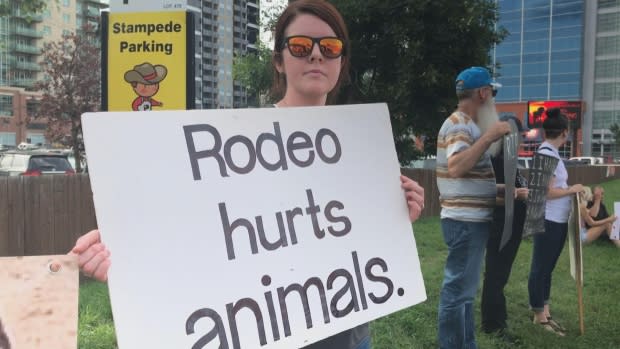Animal advocates want chuckwagon races cancelled after 3 horse deaths
Animal rights activists are calling on the Calgary Stampede to halt its chuckwagon races and review safety measures following the deaths of three horses at the Rangeland Derby this week.
The first horse died of a serious internal medical condition he experienced Monday mid-race. The Stampede said the incident was not racing related.
Another horse was put down after suffering a broken leg during a race on Wednesday.
The most recent death took place Thursday when a horse hit a guard rail and stumbled to the ground on the Stampede Park track.
"The Calgary Stampede has a long history of treating animals as disposable, and the accident last night clearly demonstrates that," said Trev Miller with the Calgary Animal Rights Effort (CARE).

Miller was one of a handful of activists who took to the Victoria Park train station to protest the rodeo and hold a vigil for the horses Friday night. Protestors held signs bearing slogans including, "Chuck the chucks" and "Rodeo hurts animals."
Horse deaths 'depressingly predictable'
The Stampede told the CBC its animals are of the highest priority. There's a zero tolerance policy for "preventable accidents and injuries," it said.
But Peter Fricker, spokesperson for the Vancouver Humane Society said its measures to make chuckwagon racing safer haven't worked — as evidenced by the "depressingly predictable" deaths that happen year over year.
The Stampede's roots can be traced to 1886, when the Calgary and District Agricultural Society held its first fair. Since then, more than 100 horses participating in Stampede events have died, according to CARE.

The Vancouver Humane Society demands the Stampede set up a panel of independent experts to determine whether chuckwagon races can be made safer every year. But Fricker said nothing ever changes.
"There's obviously going to be some high degree of risk to the horses when you've got teams of horses running at high speed taking tight turns in close proximity. It's really just a disaster waiting to happen — so those are some of the things we think they should look at," he said.
Both the number of teams in each race and total horses allowed on each team, as well as the track configuration, should be evaluated, Fricker added.
But legendary chuckwagon champion Kelly "The King" Sutherland says not much can be done to improve the rate of horse deaths.
He said the death rate is sitting at .001 per cent so far this year.
"I don't know if you can actually get that number any lower outside of eliminating the sport," the retired driver said.
Attitudes on animal entertainment changing, advocates say
That's the simple solution for Winnipeg-based animal advocate Jessica Scott-Reid.
"I'd like to see all the use of animals as entertainment for humans be over. But of course starting with the chuckwagon races seems to make the most sense, it's where the most damage is done," Scott-Reid said.
Canadians' attitudes about animals being exploited for amusement are changing, she said, so the Stampede's animals should be added to a running list of unacceptable entertainment, alongside captive whales and circus animals.
The Vancouver Humane Society also has concerns about animals being subjected to fear, pain and stress for the sake of entertainment at the Stampede.
But chuckwagon driver Kurt Bensmiller stands by his sport and its drivers' treatment of horses.

He said if they're not recruited to chuckwagon racing, horses — often retired thoroughbred racing steeds — would have nowhere to go.
Chuckwagon racing, Bensmiller added, gives horses a second chance at a "good life." He said his horses have chiropractors and massage therapists and get to take salt-water ice baths.
Bensmiller said his horses compete about 35 minutes every year.
While he has yet to lose a horse during a race, he said horse deaths are always bound to happen in his sport.
"When you hear that there's an accident, you're first worried about the guys that are involved in it and then the animal's well-being right after," he said.


